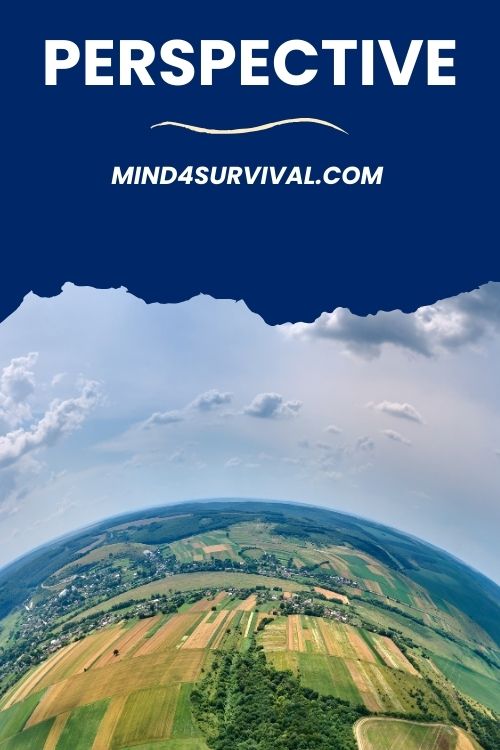Perspective is the lens through which we view and interpret everything happening within our personal environment. Our perspective is our subjective point of view, beliefs, values, etc. that are influenced by the impact of the human condition, which comprises our personal experiences, cultural and societal influences, emotions, cognitive biases, and so forth.
When it comes to prepping, it’s crucial to understand the subjective nature of perspective and its influence on our relationship with the reality of the people, places, things, and events we encounter. This understanding equips us with the knowledge necessary to recognize that we may have flaws in our perspective. Then, armed with that knowledge, we can work to minimize our flaws and, in the process, refine our perspective so it is in closer alignment with actual, objective reality.
As a result of refining our thought processes, we’ll be better prepared to navigate complex scenarios, make better-informed decisions, and ultimately enhance our ability to face any disaster, minimize unwanted struggle, and live our best possible life.
With that in mind, this article will dive into perspective, exploring its definition, its role in shaping our understanding of reality, and its relationship with perception. By unraveling the complexities of perspective, you’ll gain insights into how it molds our decisions and ultimately influences our interactions with the world around us.
What is Perspective
I define perspective as an individual’s unique point of view, shaped by their experiences, beliefs, values, emotions, cultural background, etc. It serves as a filter through which we interpret information and make meaning of our personal environment, past, present, and future. Perspective is deeply subjective because it reflects our individual perceptions as interpreted through the unavoidable filter of the human condition.
The Multifaceted Nature of Perspective
Perspective encompasses many factors that contribute to its formation and influence. Here, I’ll explore some of the critical elements that shape our perspectives.
Personal Experiences
Our unique life experiences have a profound impact on our perspectives. These experiences include our interactions with others, the challenges we face, the cultures we are exposed to, and the lessons we learn along the way. Together, our life experiences provide a rich tapestry of memories and insights that color and influence how we perceive and interpret our world.
Beliefs and Values
Our beliefs and values form the foundation of our perspectives. They act as guiding principles that influence our judgments, decisions, and behaviors. In that same vein, our religious, moral, and ethical beliefs shape our understanding of right and wrong, good and bad, and help guide our approach to life.
Cultural Background
Cultural influences significantly impact our perspectives. The traditions, customs, social norms, and values of our cultural experience shape how we see and interpret the world.
Emotional State
Our emotional state at any given moment can also affect our perspective. Emotions such as fear, joy, anger, or sadness can influence how we perceive and react to situations. When we are in a positive emotional state, we may be more inclined to see opportunities and possibilities. Conversely, negative emotions may lead to a more pessimistic or jaded outlook.
Perception and Perspective: Interplay and Distinctions

While perception and perspective are closely related, they have distinct meanings and functions.
Perception refers to the process of sensing and interpreting sensory information. It is a relatively objective process that provides us with the raw data necessary for constructing our understanding of the world. As a result, perception forms the foundation on which we build our perspective.
On the other hand, perspective goes beyond immediate sensory input. As discussed, it incorporates personal interpretations, beliefs, and values, which shape the subjective understanding of our perceptions and, ultimately, how we view reality. As a result, perspective, because of the impact of the human condition that it is filtered through, is always an inaccurate view of reality.
Shaping Our Worldview
By this point, you are aware or catching on to the fact that perspective plays a pivotal role in shaping our understanding of reality and, subsequently, how we navigate the world. With that, let’s dive into the ways perspective influences our worldview.
Interpretation of Information
Our perspective acts as a lens through which we interpret and make meaning of information. It filters incoming information, highlighting what aligns with our existing beliefs and values and potentially obscuring alternative viewpoints. This selective interpretation can reinforce our existing perspectives or feed into cognitive biases.
Conflict and Resolution
Diverse perspectives often lead to conflicts and disagreements. However, recognizing and understanding different perspectives fosters empathy, tolerance, and cooperation. It broadens our horizons, challenging us to question our assumptions and consider (not necessarily agree with) alternative viewpoints. By embracing differing perspectives, we pave the way for a deeper understanding of issues and situations, which ultimately affords us the incredible opportunity to hone and refine our perspective.
Cultivating Empathy
Perspective allows us to step into someone else’s shoes and see the world through their eyes. As before, empathy doesn’t mean we have to agree with other perspectives. However, it does help us to understand and relate to others’ experiences, emotions, and struggles. As such, we’re more likely to acknowledge the common humanity that runs through everyone, which fosters forgiveness, grace, and understanding—for ourselves and others.
Self-Reflection and Growth
Recognizing our own perspective opens the door to self-reflection and personal growth. It encourages us to examine our biases, question our assumptions, and consider alternative viewpoints. Even if that examination of our assumptions, beliefs, and points of view results in the slimmest .1% of refinement in our perspective, it is nonetheless a refinement and improvement of how we view the world. As a result, this introspection expands our intellectual horizons and helps us evolve as individuals. In other words, we are improving our mindset and making us better prepared to capitalize on opportunity while minimizing adversity.
The Bottom Line About Perspective
Perspective is a powerful lens through which we view and interpret the world. It is shaped by our experiences, beliefs, values, and cultural background and influences our understanding of reality. While perception provides the raw data, perspective adds depth and subjective meaning to our experiences.
In the end, perception makes us who we are and shapes our personalities and interactions with the world. As such, by acknowledging and embracing the fact that our perspective is a flawed, human condition-impacted version of reality, we will find ourselves in a better position to address our flaws and, in so doing, expand our understanding of the world and our relationship to everything happening within it.
And that, my friends, is the first step towards improved preparedness.
What are your thoughts on perspective and preparedness? Tell us in the comments below.
Additional Resources
Stay safe,


Read the full article here
